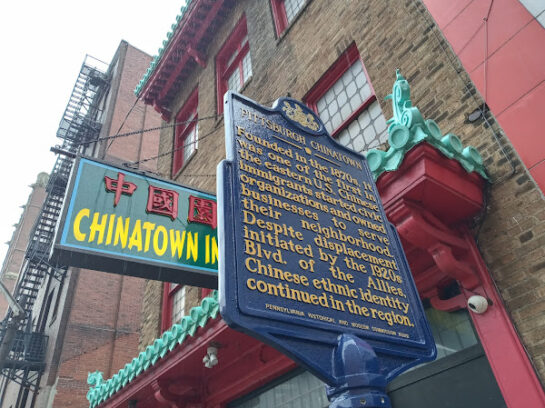Advocacy
Historic Pittsburgh Chinatown
After 12 long years of advocacy and 4 separate application attempts, OCA Pittsburgh succeeded in getting official Pennsylvania historical landmark status for Downtown’s old Pittsburgh Chinatown. The plaque commemorates the Chinese Americans who first came to Pittsburgh in the 1880's and the Chinatown district they built.
In the early 1900s, Pittsburgh’s Chinatown, on Second and Third avenues between Ross and Grant streets, was an area full of Chinese-owned businesses and restaurants. Much of the neighborhood was demolished in 1921 to build the Boulevard of the Allies, after which most of Chinatown’s residents slowly relocated elsewhere, it remains an area of historical significance. To read more about the area's history check out The Incline's article and this article from the Heinz History Center. Marian Lien, OCA Pittsburgh President, talks to newsletter editor Francesa Dabecco about the history on City Cast Pittsburgh Podcast.
A big Thank You to all the individuals on Gofundme for believing in this project. To Pitt’s Asia Studies Center for helping us write letters of support and sending funding. To AHN Highmark for always being there to support the Chinese and other communities in our city. To OCA National for underwriting the Chinatown concert, Downtown Partnerships for helping us navigate the space and needs and to WongFace for the gorgeous originally designed art marking this moment.

1882 Project
On May 6, 1882, the 1882 Chinese Exclusion Act, was the first substantial federal restriction on United States immigration. The law prohibited all immigration of Chinese laborers and was followed with many local ordinances and state laws aimed to exclude and harass Chinese laborers and merchants, often leading to violence. Several extensions to the 1882 Act were made with more restrictive and discriminatory provisions, over the next fifty years. The Chinese Exclusion Act provisions was not repealed until the 1943 Magnuson Act, allowing the naturalization of Chinese, and the 1965 Hart Cellar Act, removing the restriction on immigration of Chinese individuals.
Affirmative Action
OCA recognizes equal opportunity admission policies as a cornerstone program that effectively responds to historical discrimination, racial economic disparities, and promotes a more equitable playing field for all APA students. By expanding opportunity to the historically underprivileged, higher education policies can empower and advance communities. The community’s support is demonstrated in accordance with a 2011 Asian American Legal Defense and Education Fund (AALDEF) report, that says that 75% of Asian American support equal opportunity programs.
Immigration
AAPI immigrants, refugees, and asylum seekers should have the ability to equitably sponsor their families to the United States; live without constant fear of detention and deportation; and be provided due process rights if they are ensnared within our country’s detention and deportation system. As such, OCA believes that the family immigration system must address the massive backlog of visa applications, of which 1.8 million are from Asian countries.
Military Hazing
In 2011, Private Danny Chen’s death was caused by racialized bullying inflicted by his eight superior officers. This incident and other similar instances in the Armed Forces where individuals were led to suicide as a result of hazing and bullying caused an upwelling of support for a revised approach to these issues. OCA has remained committed to creating a uniform database to track hazing incidents inclusive of a victim’s race, sex, religion, and sexual orientation. Those who serve our country must be protected when they are with their troops and not in active combat.
Voting Rights
OCA is a strong advocate for voters rights. As the fastest group of new immigrants, Asian Americans are increasingly gaining political power through both representation and voting blocs.
OCA is proud to partner with the Asian American Legal Defense and Education Fund’s (AALDEF) Democracy Program to protect individuals’ right to vote.
Education
Education is often referred to as the great equalizer and a key component for social and economic mobility for all Americans. OCA believes that K-12 and higher education must be fully accessible to all Asian Americans and Pacific Islanders. To this end, OCA’s education priorities include ensuring that student data is disaggregated so that necessary resources can be provided to our most needing communities.
The OCA Civil Rights Fellowship
The OCA Civil Rights Fellowship Program was created to provide hands-on training for talented young Asian Pacific American (APA) leaders on issues to create greater access to educational and economic opportunities, and strategically address discriminatory practices, disparities, policies, hate speech, and race motivated violence against APAs. Working with the staff at the OCA National Center in Washington, DC, the Fellow works closely with Congress, the Administration, and other national social justice organizations to advance the well-being of APA communities across the country.
APA History Month
Inspired by proclamations for Black History Month and Hispanic Heritage Week, Ms. Jeannie Jew and Ms. Ruby Moy, congressional staffers, sought to have similar legislation enacted for Asian Americans. The nationwide effort was coordinated by the National Coalition for a Pacific/Asian American Heritage Proclamation, founded and chaired by Jeannie F. Jew, an OCA National Board member. Also involved with the founding of this celebration was K.L. Wang, founder of OCA.
Xenophobia
OCA is deeply concerned surrounding the uptick in anti-Asian rhetoric and violence in recent years.
The long term consequences of fear mongering and xenophobic rhetoric is most commonly seen in the case of Vincent Chin, a Chinese American man from Detroit. Chin was savagely beat to death by two laid-off auto workers who had blamed their termination by the booming auto industry in Japan in the 1980s. The economic scapegoating led to the death of Chin while the two individuals were tried and released with a fine and no jail time.
